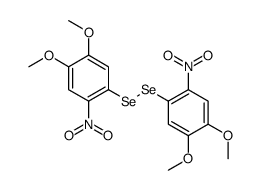BIS(4,5-DIMETHOXY-2-NITROPHENYL)DISELENIDE
Modify Date: 2025-09-26 10:57:51

BIS(4,5-DIMETHOXY-2-NITROPHENYL)DISELENIDE structure
|
Common Name | BIS(4,5-DIMETHOXY-2-NITROPHENYL)DISELENIDE | ||
|---|---|---|---|---|
| CAS Number | 58257-01-5 | Molecular Weight | 522.22700 | |
| Density | N/A | Boiling Point | N/A | |
| Molecular Formula | C16H16N2O8Se2 | Melting Point | N/A | |
| MSDS | N/A | Flash Point | N/A | |
| Name | 1-[(4,5-dimethoxy-2-nitrophenyl)diselanyl]-4,5-dimethoxy-2-nitrobenzene |
|---|
| Molecular Formula | C16H16N2O8Se2 |
|---|---|
| Molecular Weight | 522.22700 |
| Exact Mass | 523.92400 |
| PSA | 128.56000 |
| LogP | 1.85800 |
Synonym: Section 2 - COMPOSITION, INFORMATION ON INGREDIENTS
Risk Phrases: 23/25 33 Section 3 - HAZARDS IDENTIFICATION EMERGENCY OVERVIEW
Toxic by inhalation and if swallowed. Danger of cumulative effects. Potential Health Effects Eye: May cause eye irritation. Skin: May cause skin irritation. Ingestion: Poison by ingestion. The toxicological properties of this substance have not been fully investigated. Inhalation: The toxicological properties of this substance have not been fully investigated. Toxic if inhaled. Chronic: Not available. Section 4 - FIRST AID MEASURES Eyes: Immediately flush eyes with plenty of water for at least 15 minutes, occasionally lifting the upper and lower eyelids. Get medical aid immediately. Skin: Get medical aid immediately. Immediately flush skin with plenty of water for at least 15 minutes while removing contaminated clothing and shoes. Ingestion: Get medical aid immediately. Wash mouth out with water. Inhalation: Remove from exposure and move to fresh air immediately. If not breathing, give artificial respiration. If breathing is difficult, give oxygen. Get medical aid. Notes to Physician: Section 5 - FIRE FIGHTING MEASURES General Information: As in any fire, wear a self-contained breathing apparatus in pressure-demand, MSHA/NIOSH (approved or equivalent), and full protective gear. Extinguishing Media: Use extinguishing media most appropriate for the surrounding fire. Section 6 - ACCIDENTAL RELEASE MEASURES General Information: Use proper personal protective equipment as indicated in Section 8. Spills/Leaks: Vacuum or sweep up material and place into a suitable disposal container. Section 7 - HANDLING and STORAGE Handling: Do not breathe dust, vapor, mist, or gas. Do not get in eyes, on skin, or on clothing. Use only in a chemical fume hood. Storage: Store in a cool, dry place. Store in a tightly closed container. Section 8 - EXPOSURE CONTROLS, PERSONAL PROTECTION Engineering Controls: Use adequate ventilation to keep airborne concentrations low. Exposure Limits CAS# 58257-01-5: Personal Protective Equipment Eyes: Not available. Skin: Wear appropriate protective gloves to prevent skin exposure. Clothing: Wear appropriate protective clothing to prevent skin exposure. Respirators: Follow the OSHA respirator regulations found in 29 CFR 1910.134 or European Standard EN 149. Use a NIOSH/MSHA or European Standard EN 149 approved respirator if exposure limits are exceeded or if irritation or other symptoms are experienced. Section 9 - PHYSICAL AND CHEMICAL PROPERTIES Physical State: Solid Color: yellow Odor: Not available. pH: Not available. Vapor Pressure: Not available. Viscosity: Not available. Boiling Point: Not available. Freezing/Melting Point: 211 - 214 deg C Autoignition Temperature: Not available. Flash Point: Not available. Explosion Limits, lower: Not available. Explosion Limits, upper: Not available. Decomposition Temperature: Solubility in water: Specific Gravity/Density: Molecular Formula: Molecular Weight: 522.23 Section 10 - STABILITY AND REACTIVITY Chemical Stability: Not available. Conditions to Avoid: Incompatible materials. Incompatibilities with Other Materials: Strong oxidizing agents. Hazardous Decomposition Products: Carbon monoxide, oxides of nitrogen, carbon dioxide. Hazardous Polymerization: Has not been reported Section 11 - TOXICOLOGICAL INFORMATION RTECS#: CAS# 58257-01-5 unlisted. LD50/LC50: Not available. Carcinogenicity: Bis(4,5-dimethoxy-2-nitrophenyl)diselenide - Not listed by ACGIH, IARC, or NTP. Section 12 - ECOLOGICAL INFORMATION Section 13 - DISPOSAL CONSIDERATIONS Dispose of in a manner consistent with federal, state, and local regulations. Section 14 - TRANSPORT INFORMATION IATA Shipping Name: SELENIUM COMPOUND, N.O.S. Hazard Class: 6.1 UN Number: 3283 Packing Group: III IMO Shipping Name: SELENIUM COMPOUND, N.O.S. Hazard Class: 6.1 UN Number: 3283 Packing Group: III RID/ADR Shipping Name: SELENIUM COMPOUND, N.O.S. Hazard Class: 6.1 UN Number: 3283 Packing group: III Section 15 - REGULATORY INFORMATION European/International Regulations European Labeling in Accordance with EC Directives Hazard Symbols: T Risk Phrases: R 23/25 Toxic by inhalation and if swallowed. R 33 Danger of cumulative effects. Safety Phrases: S 20/21 When using do not eat, drink or smoke. S 28A After contact with skin, wash immediately with plenty of water. S 45 In case of accident or if you feel unwell, seek medical advice immediately (show the label where possible). WGK (Water Danger/Protection) CAS# 58257-01-5: No information available. Canada None of the chemicals in this product are listed on the DSL/NDSL list. CAS# 58257-01-5 is not listed on Canada's Ingredient Disclosure List. US FEDERAL TSCA CAS# 58257-01-5 is not listed on the TSCA inventory. It is for research and development use only. SECTION 16 - ADDITIONAL INFORMATION N/A |